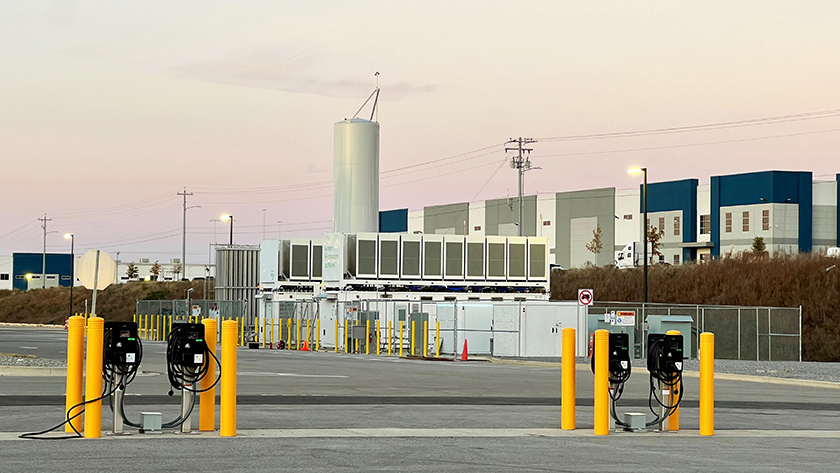How Hydrogen Fuel Cells are Transforming EV Charging Infrastructure
The rise of electric vehicles (EVs) is reshaping the future of transportation. As more people embrace EVs, the demand for a reliable and scalable charging infrastructure has grown significantly. A well-developed charging network is essential to support this transition and ensure convenience for EV drivers.

Traditional charging methods rely heavily on the power grid, which faces limitations during peak demand and challenges in reaching remote or densely populated areas. This is where hydrogen fuel cells come in. High-power hydrogen fuel cells offer a clean, efficient, and flexible solution to support EV charging infrastructure.
In this blog, we explore how hydrogen fuel cells work, their benefits for EV charging, real-world applications, and their potential to address the growing demand for sustainable energy solutions.
The Growing Need for EV Charging Solutions
The adoption of electric vehicles (EVs) has been growing at an unprecedented rate worldwide. Governments, businesses, and consumers are increasingly prioritizing EVs as a key part of the transition to cleaner transportation. However, this rapid growth has brought with it the urgent need for a reliable and extensive EV charging infrastructure to meet the growing demand.
Challenges with Existing Charging Infrastructure
- Grid Dependency and Strain
Most EV charging stations are tied to the electrical grid. As EV adoption grows, the grid faces increasing strain, particularly during peak demand. The added load can lead to inefficiencies and outages, making it harder to scale charging networks effectively. - Limited Charging Locations in Remote and Urban Areas
In remote regions, access to charging stations is scarce due to the high cost of expanding the grid to isolated locations. Even in cities, building new infrastructure to meet demand can be challenging and expensive due to space constraints and high population density. - Long Charging Times for Fast-Charging Alternatives
Even with fast-charging stations, charging an EV can take 20 to 60 minutes, which is longer than refueling a traditional gasoline or hydrogen-powered vehicle. This delay can create bottlenecks at charging stations, especially during high-demand periods.

Hydrogen fuel cells provide a practical solution to many challenges in EV charging infrastructure by generating electricity on-site. Unlike traditional grid-based systems, hydrogen-powered chargers reduce dependence on the grid, easing strain and ensuring reliable operations even in areas where expanding the grid is costly or impractical. This makes them ideal for both remote regions and urban centers facing infrastructure limitations.
For more details on how hydrogen systems can address grid challenges and enhance EV charging networks, check this webinar. Additionally, insights from this resource highlight their potential to create scalable, efficient charging networks.
How Hydrogen Fuel Cells Work for EV Charging
Hydrogen fuel cells generate electricity through an electrochemical process that combines hydrogen and oxygen. Unlike traditional power generation, this process does not involve combustion, making it cleaner and more efficient. The electricity produced can power EV charging stations directly, making hydrogen fuel cells an innovative solution for the growing EV charging infrastructure.
Key Components of a Hydrogen Fuel Cell System
- Hydrogen Supply:
Hydrogen gas, the primary fuel, is stored on-site in pressurized tanks. These tanks are designed for safety and efficiency, ensuring a steady and reliable hydrogen supply. - Fuel Cell Stack:
The core of the system, the fuel cell stack, is where magic happens. Hydrogen molecules are split into protons and electrons. The electrons flow through an external circuit, generating electricity, while the protons combine with oxygen from the air to form water as the only by-product. - Power Conditioning System:
The electricity generated by the fuel cell stack is in direct current (DC) form. A power conditioning system converts this into alternating current (AC), which is used by most EV chargers. This ensures compatibility with a wide range of charging technologies. - Cooling System:
Fuel cells generate heat during operation, so a cooling system is often included to maintain optimal performance and prevent overheating.
Hydrogen Fuel Cells vs. Grid-Based Charging
Hydrogen fuel cells offer several distinct advantages compared to traditional grid-based charging systems:
- On-Site Electricity Generation:
Fuel cells produce electricity locally, reducing the load on the power grid. This is particularly beneficial during peak demand periods when the grid is most strained. - Flexibility in Installation:
Unlike grid-based systems that require extensive infrastructure, hydrogen-powered EV charging stations can be installed in remote or off-grid areas, as well as in cities with limited grid expansion capacity. - Environmental Impact:
While grid-based EV charging depends on the energy mix of the grid, which may include fossil fuels, hydrogen fuel cells produce zero emissions during operation. The only by-product is water, making them a cleaner and more sustainable option. - Efficiency and Reliability:
Hydrogen fuel cells operate continuously if hydrogen is available, making them reliable for 24/7 EV charging needs. Unlike grid-based systems that may face outages or fluctuations, fuel cells ensure consistent power delivery.

The Role of Hydrogen in EV Charging
Hydrogen serves as an energy carrier, enabling stations to generate electricity on demand. This approach minimizes energy losses associated with grid transmission and allows for greater control over the energy supply. Additionally, hydrogen can be produced using renewable energy sources such as wind or solar, further enhancing its environmental benefits.
By leveraging the unique capabilities of hydrogen fuel cells, EV charging stations can become more flexible, reliable, and sustainable, supporting the growing demand for electric vehicles across diverse locations.
Advantages of Fuel Cells for EV Charging
Hydrogen fuel cells provide several key advantages that make them a highly effective and sustainable solution for EV charging infrastructure. These benefits address many of the limitations of traditional grid-based systems.
1. Scalability
Fuel cells are easily adaptable to various scales of operation, from small charging stations to large hubs. As EV adoption increases, hydrogen systems can be expanded to meet the growing demand without requiring significant infrastructure changes.
2. Reduced Grid Strain
Unlike traditional chargers, which depend heavily on the power grid, fuel cells generate electricity on-site. This reduces the load on the grid, especially during peak hours, and provides a stable energy source for EV charging. By decentralizing energy production, fuel cells also improve the overall reliability of the charging network.
3. Faster Charging
Fuel cells can support fast-charging technologies by delivering consistent and uninterrupted power. This capability helps reduce waiting times for EV drivers, ensuring a smoother charging experience. On-site hydrogen storage further enhances this benefit, as stations can maintain high power output without relying on grid performance.
4. Eco-Friendly Operation
Hydrogen fuel cells produce zero harmful emissions during operation, with water being the only by-product. While traditional grids may rely on electricity from fossil fuels, hydrogen systems offer a cleaner alternative. Transitioning to renewable hydrogen produced through electrolysis using wind or solar energy can maximize the environmental benefits.
5. Remote Accessibility
Fuel cells are particularly advantageous for charging stations in remote or off-grid locations. They eliminate the need for extensive grid expansion, making them cost-effective and practical in areas where traditional infrastructure is difficult to establish. For example, rural highways, isolated towns, and underserved regions can benefit from this flexibility.

By addressing scalability, environmental concerns, and grid limitations, hydrogen fuel cells provide a future-ready solution for building a reliable and sustainable EV charging network.
Case Studies and Real-World Applications
Hydrogen fuel cells are already being used to support EV charging in various parts of the world. These real-world examples highlight how this technology is helping to build a sustainable and reliable charging infrastructure.
1. Japan’s Hydrogen-Powered EV Charging Stations
Japan has been a global leader in adopting hydrogen technology. Several hydrogen-powered EV charging stations have been established, particularly in areas where grid expansion is difficult. These stations generate electricity on-site using hydrogen fuel cells, reducing reliance on the grid and ensuring a steady supply of clean energy for EVs.
2. Insights from European Deployments
In Europe, hydrogen fuel cell technology is being integrated into EV charging networks to support the region’s ambitious sustainability goals. Countries like Germany and the Netherlands have invested in hydrogen-powered stations to meet the rising demand for EV charging while reducing the environmental impact of traditional grid systems.
For a deeper dive into the benefits of hydrogen-powered EV charging, you can refer to this whitepaper. These real-world applications demonstrate how hydrogen fuel cells are already transforming the EV charging landscape, paving the way for broader adoption across the globe.
Challenges and Solutions
1. Hydrogen Production and Infrastructure
Challenge: Delivering hydrogen to remote or off-grid areas can be costly and logistically complex.
Solution: Localized hydrogen production using renewable energy, such as solar or wind, can reduce transportation costs and increase efficiency.
2. Initial Investment Costs
Challenge: Higher upfront costs compared to grid-based systems.
Solution: Long-term savings from lower maintenance and operational costs, along with government incentives, can offset initial expenses.
3. Perception of Hydrogen Technology
Challenge: Misconceptions about hydrogen safety and viability persist.
Solution: Public education and showcasing successful projects can build confidence in hydrogen fuel cells as a reliable and safe solution.
By addressing these challenges, hydrogen fuel cells can further establish themselves as a sustainable option for EV charging.
Future of Hydrogen Fuel Cells in EV Charging
Hydrogen fuel cells are set to play a transformative role in the future of EV charging. As technology evolves and demand for clean energy grows, fuel cells offer promising opportunities to enhance charging infrastructure.
1. Emerging Innovations in Fuel Cell Technology
Ongoing advancements, such as more durable fuel cell components and improved hydrogen storage, are increasing efficiency and reducing costs. These innovations are making fuel cells more accessible and practical for large-scale deployment.
2. Integration with Renewable Energy
Hydrogen fuel cells can be paired with solar or wind energy to produce green hydrogen. This integration creates a fully sustainable charging solution, reducing reliance on fossil fuels and grid-based electricity.
3. Market Growth and Adoption
The global push for clean energy is driving investments in hydrogen technologies. Governments and industries are recognizing the potential of fuel cells to support growing EV adoption, especially in areas where traditional infrastructure falls short.
As fuel cells become more efficient, cost-effective, and sustainable, they are poised to become a cornerstone of EV charging infrastructure, bridging the gap between environmental goals and practical energy solutions.
Conclusion
The rise of electric vehicles has brought a pressing need for reliable, scalable, and sustainable charging infrastructure. Hydrogen fuel cells offer a clean, efficient, and flexible solution to many challenges faced by traditional grid-based systems. By generating electricity on-site, fuel cells reduce grid strain, support fast-charging technologies, and enable charging in both remote areas and urban centers.
With advancements in fuel cell technology and growing integration with renewable energy, hydrogen is positioned to play a key role in transforming EV charging infrastructure. By addressing challenges like production logistics and initial costs, hydrogen fuel cells can drive the transition to a greener, more sustainable future.
As the demand for EVs continues to grow, hydrogen fuel cells are not just an alternative, but they are a necessary innovation to meet the energy needs of tomorrow.
References
- Plug Webinar: Grid Constraints and the Future of EVs
- Plug 2-Pager: Grid Constraints and the Future of EVs
- Plug Whitepaper: Distributed Energy Resources for EV Charging
- PV Magazine: Remote EV Charging with Hydrogen Generators
- Grandview Research: Fuel Cell Market Analysis and Growth
- Energy.gov: The Role of Hydrogen in EV Charging
- Startus Insights: Emerging Fuel Cell Innovations